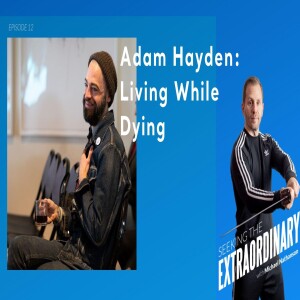
Wednesday Jun 16, 2021
Adam Hayden: Living While Dying
Adam Hayden is a philosopher, writer, advocate and community organizer. He's married and has three young children. He's witty, charming, brilliant, and full of life.
And in 2016, he was diagnosed with glioblastoma, one of the deadliest and most common forms of brain cancer. Glioblastoma or GBM has a median survival time of approximately 10 to 16 months and a five-year survival rate of only about 5%, making our guest's survival for five years, quite rare. GBM is the form of brain cancer that took Ted Kennedy, John McCain, Beau Biden, Tug McGraw, Ethel Mermen, and Neil Peart from us. But Adam says he is living while dying. He is published on medical education, cancer survivorship, and the philosophy of illness in both the popular and academic press. He completed the requirements for his graduate degree in philosophy while in active cancer treatment and was recently awarded the distinguished alumni award by his university.
He's an investigator with the patient centered Outcomes Research Institute, grant funded brain cancer, quality of life collaborative. He's an American Association for Cancer Research scientist survivor program participant. A Stanford university medicine, ex E patient scholar and speaker, and was a speaker at the 2019 End Well symposium and event focused on de- medicalizing the end of life. As a champion for early intervention of the palliative care service, he offers a unique perspective on the end of life as a young dad and husband. He served three years as a reviewer for the peer reviewed cancer research program, a grant funding organization that resides within the Department of Defense.
And he now serves this program on the programmatic review committee. He also served as an advisor on two projects with the broad Institute at MIT and Harvard. He is a regular lecturer in hospital settings, and he's delivered, invited talks at the Fairbank Center for Medical Ethics, the Indiana University School of Medicine Center for Bioethics, the St. Louis University Center for Bioethics and the Indiana University School of Medicine, palliative care fellowship program.
No comments yet. Be the first to say something!